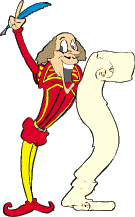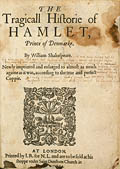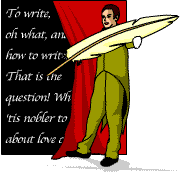| (insert your NIE or newspaper logo here) |
Weekly Online LessonOnline Lesson ArchiveGrade Level: 7-12
|
The Play's the Thing
 No
playwright is as famous
as William Shakespeare, and so fans worldwide will
again celebrate his traditional birthday on and around
April 23.
No
playwright is as famous
as William Shakespeare, and so fans worldwide will
again celebrate his traditional birthday on and around
April 23.
In 2006, some literary collectors have an additional reason for celebrating Shakespeare this spring: one of the most important publications of Shakespeare's works will soon be up for bidding at a public auction.
It's believed that only 750 copies of the highly prized and well-guarded collection—called "The First Folio"—were published in 1623, by some of Shakespeare's friends seven years after he died. The collection contains 36 plays and was the first to include 18 of his works—like Twelfth Night and Macbeth—which had never been printed before.
This week's lesson will lead you through your own celebration of Shakespeare's life and his passion for playwriting. First, you'll explore his life and works, and then you'll get tutored in the art of playwriting and get a chance to write your own play.
Shakespeare's Life & Works
 Start
by
Discovering
Shakespeare at the Folger Shakespeare Library. As you'll soon
learn, Shakespeare was not only a playwright; he
was also a poet and an actor.
Start
by
Discovering
Shakespeare at the Folger Shakespeare Library. As you'll soon
learn, Shakespeare was not only a playwright; he
was also a poet and an actor.
Read the brief introduction, and then dive deeper into Shakespeare's Life with his Stratford Beginnings, his Success in London, and The Final Years.
What conditions and relationships were especially strong in shaping Shakespeare's life in this Expansive Age? In what ways did Shakespeare influence the different facets of society? Why are the details of Shakespeare's Story still in dispute?
Now, let's take a good look at Shakespeare's Works, specifically at some of The Plays. Here, you'll find plot summaries and expert commentary on most of his known plays. Choose a few in each category—Comedies, Histories, and Tragedies—to review.
For example, start out with Alls Well That Ends Well or The Merchant of Venice, in the comedy section. Explore history-based plays like King John and Henry V, and enduring tragedies, including Hamlet, Julius Caesar, and Othello.
How do the different plays compare in setting, key characters, and plot? Why do you think these plays have continued to attract audiences, centuries after they were written?
 If
you have time, also peruse The
Poems section, get some pointers on Reading
Shakespeare's Language, and learn more about The
Publication of Shakespeare's Plays, including why The
First Folio is a key collection.
If
you have time, also peruse The
Poems section, get some pointers on Reading
Shakespeare's Language, and learn more about The
Publication of Shakespeare's Plays, including why The
First Folio is a key collection.
Before leaving Folger Library, get a glimpse of Shakespeare's Theater to get an idea of where these plays were performed. Learn more about the London Playhouses and Other Sites, discover what Inside the Theaters was like, how Staging and Performance was done, and how Business Arrangements were made among the acting companies and theaters.
For what reasons were "scene changes" often signaled by character entrances rather than by physical changes in the stage set? In what ways have conditions for actors and theater owners changed since Shakespeare's time? In what ways have they generally stayed the same?
To polish off your exploration into Shakespeare's life, visit the online version of The Complete Works of William Shakespeare. Choose one or more of the plays that match those you reviewed at the Folger Library. At this site, read the whole story and get more familiar with the characters. Follow closely the two or three main characters. What does each character want? Is he or she involved in any conflict with another? What obstacles exist? How does the conflict get resolved and what are the consequences?
Note: You may also wish to watch a live performance or feature film of the play, to get an even stronger sense of how the story flows and characters interact.
Playwriting 101
 While
Shakespeare clearly had some superior playwriting
talents, with some guidance and practice, anyone can
write a play.
While
Shakespeare clearly had some superior playwriting
talents, with some guidance and practice, anyone can
write a play.
To start you off, learn some basic skills at Playwriting 101. Start at the top of the Table of Contents with The Play's the Thing and Types of Plays and Different Theater Spaces. In which kinds of theaters have you been an audience member or actor before?
Now, let's get to the heart of things: Story structure. Why is the sequence of exposition, complication, and resolution critical to a good story? What are some of the key components of Story Development? Write down or print the Top Ten List. If possible, go back and review one of Shakespeare's plays again. This time, use the list to jot down more detailed notes about the plot and characters. What does each character "show" rather than "tell"? From "hearing" each character's distinctive voice, how would you describe each of them? Identify the event or conflict that the play's plot hinges on, and so forth.
Continue through the tutorial to learn about the mechanics of writing a play. For example, What does a play look like? And, What are the acceptable Manuscript Format Elements and Play Page Layout that should be used? Continue reviewing these specifics until completed.
Newspaper Activities
Over the next few weeks, read Targetnewspaper. Follow a few news stories that have been reported on for two or more days and which seem to involve conflict or some other type of relationship between two or more individuals or group. Choose one of the unfolding dramas as the basis for a play. Is this a comedy or a tragedy? Start developing your plot by identifying the main characters, along with what is at stake for each, and other key elements following your Playwright's Top Ten List. Based on your research, write a Ten-Minute fictionalized play based on the news story. (Like Shakespeare's "history" plays, your play does not have to strictly follow reality.) You are writing this play so that, ultimately, fellow classmates can act it out. So, make sure to consider the type of theater space in which it will likely be performed, and what kinds of props could be easily found and used. Type up your play in an acceptable format. As the play's director, assign character parts to classmates, distribute your script, set-up and run rehearsals, gather props, etc. Finally, perform your play in front of an audience.
© Copyright 2006
Learners Online, Inc.
